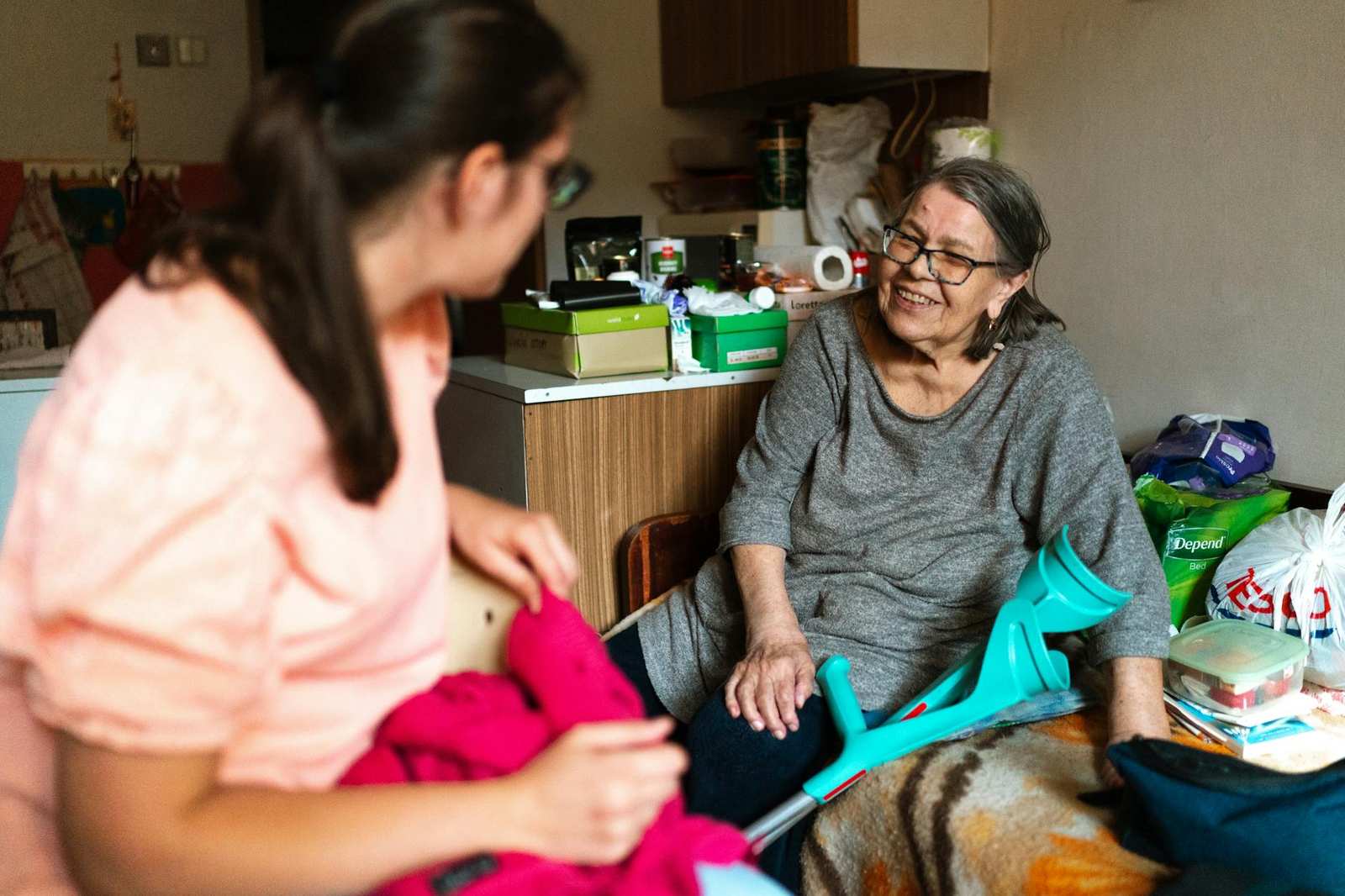Caregiver Jobs with Visa Sponsorship in Canada: Opportunities

As the demand for caregiving services grows in Canada, many families seek qualified individuals to fill these vital roles. This need has opened doors for caregiver jobs with visa sponsorship in Canada, making it easier for international candidates to find work and build a future here.
In this post, we’ll explore the current landscape of caregiver jobs offering visa support, including available opportunities and what it takes to apply. We understand that pursuing work abroad can be daunting, but these caregiver positions provide a pathway for those with a compassionate nature and a desire to help others.
Our insights will guide you through the application process, salary expectations, and tips for finding the right job match. Whether you’re exploring options or ready to take the leap, we’ll equip you with essential information to make informed decisions about your caregiving career in Canada.
Understanding Caregiver Jobs with Visa Sponsorship in Canada
For those considering a career as a caregiver in Canada, it’s important to understand the types of positions available and the responsibilities these roles entail. This knowledge helps us make informed choices about our career paths and sets the groundwork for applying for jobs that offer visa sponsorship.
Types of Caregiver Positions
Canada offers a variety of caregiver roles, each with unique responsibilities and work environments. Understanding these types helps us determine which position aligns with our skills and interests. Some common caregiver positions include:
- Personal Support Workers (PSWs): These professionals assist individuals with daily living activities. They provide personal care, including bathing, dressing, and mobility support. PSWs often work in residential homes or healthcare facilities.
- Live-In Caregivers: This role allows caregivers to reside in the client’s home while providing care. Live-in caregivers typically assist with household chores, childcare, and personal care for individuals with disabilities or elderly clients.
- Childcare Providers: Often referred to as nannies, these caregivers focus on the needs of children. Their responsibilities may include supervising play, preparing meals, and aiding with homework. This role is crucial for working parents who need dependable childcare support.
- Home Support Workers: These individuals provide various services, including companionship, meal preparation, and assistance with household tasks. They play a vital role in helping clients maintain a certain quality of life within their homes.
By familiarizing ourselves with these roles, we enhance our ability to find specific caregiver jobs with visa sponsorship in Canada that suit our interests.
Key Responsibilities of Caregivers
Caregiving involves various responsibilities aimed at ensuring the well-being of clients. Understanding these duties is essential for prospective caregivers to know what the job entails. Key responsibilities typically include:
- Assisting with Daily Living Activities: Caregivers often help clients with essential tasks such as bathing, grooming, and meal preparation. This assistance is vital for those who have difficulty performing these tasks independently.
- Providing Emotional Support: Many caregivers also play an emotional support role. They offer companionship and conversation, helping clients feel valued and less isolated. This can significantly improve a client’s mental well-being.
- Ensuring Patient Safety: Caregivers must always prioritize the safety of their clients. This includes monitoring their health and adapting the living environment to reduce hazards.
- Administering Medication: In some roles, particularly in healthcare settings, caregivers may be responsible for administering medication and monitoring patients for side effects or complications.
- Maintaining Clean and Safe Environments: Caregivers often keep the living space tidy and safe. This includes light housekeeping tasks and ensuring areas are free of hazards that could lead to accidents.
By understanding these responsibilities, we can better prepare for the demands of caregiver jobs and enhance our ability to succeed in these rewarding positions.
Visa Sponsorship Process
Understanding the visa sponsorship process is crucial for anyone seeking caregiver jobs with visa sponsorship in Canada. This involves meeting specific eligibility requirements, navigating the application process, and knowing the role of employers in facilitating sponsorship.
Eligibility Requirements
To apply for caregiver jobs with visa sponsorship in Canada, we need to meet various qualifications. Here are the key requirements:
- Educational Background: Generally, a high school diploma is necessary. Some roles may require post-secondary education or certifications in caregiving or healthcare.
- Experience and Skills: Relevant experience in caregiving enhances our applications. Skills such as patience, empathy, and proficiency in managing daily living activities are highly sought after.
- Language Proficiency: Applicants must demonstrate proficiency in English or French, the two official languages of Canada. This may involve taking language tests to verify skills.
- Health and Character Requirements: We may be required to undergo medical examinations and background checks to ensure we are fit for work and adhere to Canadian standards.
Application Process
The application process for caregiver positions offering visa sponsorship requires careful planning and attention. Here’s how we can approach it:
- Search for Job Listings: We can find caregiver job openings on job boards and websites specifically focusing on caregivers, such as Indeed or LinkedIn.
- Prepare Application Materials: A well-crafted resume highlighting our relevant experience, skills, and certifications is essential. We should also include a cover letter expressing our interest in the position and why we are suitable for it.
- Submit Applications: After identifying suitable positions, we can apply directly through the employer’s website or job platforms. It’s beneficial to tailor our applications for each role.
- Follow-Up: After submitting applications, following up politely can express our continued interest in the position and help us stand out to potential employers.
- Secure a Job Offer: Once an offer is extended, we will engage with the employer to finalize visa sponsorship details.
The entire application process can feel overwhelming, but knowing where to apply and how to present ourselves increases our chances of success.
Role of Employers in Sponsorship
Employers play a vital role in the visa sponsorship process for caregivers. Here’s how they contribute:
- Job Offer: Employers need to provide a valid job offer. This job offer is a prerequisite for initiating the visa sponsorship process.
- Labour Market Impact Assessment (LMIA): In many cases, employers must obtain an LMIA, demonstrating that there are no Canadians available to fill the position. This process reinforces the need for skilled caregivers from abroad.
- Assistance with Visa Application: Some employers may assist with the visa application process. This can include providing necessary documentation and guidance on what to expect.
- Compliance with Regulations: Employers must ensure they comply with all immigration regulations. This includes making sure caregivers understand the terms of their employment and the responsibilities involved.
Benefits of Working in Canada as a Caregiver
Canada provides a supportive and rewarding environment for caregivers. Understanding the benefits of working in this field is essential for those considering such a career path.
Compensation and Benefits
Working as a caregiver in Canada comes with competitive compensation and a range of benefits. The average salary for a caregiver typically varies based on experience, location, and the nature of the care provided. Here’s what we can expect:
- Average Salaries: The average hourly wage for caregivers is around CAD 21.27, which translates to approximately CAD 37,050 annually for full-time positions. Entry-level roles may start at about CAD 24,375 per year, while seasoned caregivers can make significantly more.
- Benefits Packages: Many employers offer benefits that include health insurance, vacation days, and paid sick leave. These benefits contribute to a healthier work-life balance, allowing caregivers to manage their personal well-being while providing care.
- Work-Life Balance: Caregivers often enjoy flexible working hours. This flexibility allows us to balance our professional responsibilities with personal commitments, making it easier to manage family life or pursue educational goals.
Support for Immigrants
Canada is well-known for its inclusive approach to immigration, particularly for caregivers. Various resources and support systems are in place to help immigrant caregivers integrate smoothly.
- Government Resources: The Canadian government provides extensive information on immigration pathways for caregivers. Programs that offer support with settling in and securing jobs are readily available.
- Community Support Networks: Several organizations focus on aiding immigrant caregivers. These networks offer workshops, guidance on job applications, and information about local resources. For instance, the Multicultural Mental Health Resource Centre provides support and education specifically for caregivers.
- Pilot Programs: Recently announced programs aim to provide caregivers with permanent residency status upon arrival. This initiative not only simplifies the immigration process but also encourages caregivers to pursue long-term careers in Canada.
The combination of competitive compensation and robust support systems ensures that working as a caregiver in Canada is a fulfilling and viable career choice for many international candidates.
Challenges Faced by Caregivers
Caregiving in Canada presents a unique set of challenges that can impact both new and experienced caregivers. Understanding these challenges is crucial for anyone considering a caregiving role in the country. The struggles can vary widely, but two primary areas of concern often emerge: cultural adjustment and workplace regulations.
Cultural Adjustment
Moving to Canada as a caregiver involves significant cultural transitions. New caregivers may encounter a variety of cultural differences that require adjustments. Here’s what to consider:
- Communication Styles: Canadians might have different communication approaches compared to caregivers’ home countries. Understanding local expressions, slang, and non-verbal cues is important for effective interactions.
- Social Norms: Expectations regarding personal space, eye contact, and greetings can differ greatly. Familiarizing ourselves with these customs can facilitate smoother relationships with clients and their families.
- Healthcare System: The Canadian healthcare system may differ from what we are accustomed to. Learning how healthcare operates, including the roles of various professionals, can be essential for delivering quality care.
- Support Networks: Finding community support is vital. Connecting with local immigrant and caregiver organizations can provide valuable resources and a sense of belonging.
Adapting to these cultural elements can be challenging but rewarding, ultimately enriching our caregiving experience.
Workplace Regulations
Caregivers in Canada must adhere to various workplace regulations designed to protect both employees and clients. Being aware of these regulations helps ensure compliance and enhances our professional standing. Key regulations include:
- Legal Obligations: Employers must comply with the Employment Standards Act, which covers hours of work, wages, and overtime pay. Familiarizing ourselves with these laws can ensure fair treatment at work.
- Duty to Accommodate: Canadian employers have a legal duty to accommodate family caregivers. This means they should consider flexible work arrangements for employees balancing work with caregiving responsibilities. Understanding this duty can aid in advocating for our needs.
- Health and Safety Standards: Caregivers must maintain safe working conditions. Compliance with health and safety regulations is essential to protect ourselves and our clients. Recognizing workplace hazards and reporting them can help promote a safer environment.
- Access to Training: Employers are encouraged to provide training on health and safety practices. This training improves awareness and equips caregivers with the tools to handle various situations effectively.
Understanding these workplace regulations empowers us to advocate for our rights and ensures our working environment is safe and supportive.
Future of Caregiver Jobs in Canada
The landscape for caregiver jobs in Canada is evolving quickly. With an aging population and increasing life expectancies, the demand for caregiving services is expected to grow significantly. This growth presents robust opportunities for individuals looking to enter this field, especially with options for visa sponsorship available. Understanding the current trends and initiatives in Canada will prepare us for future career prospects in caregiving.
Trends in the Caregiving Industry
As we examine the future of caregiver jobs, several key trends emerge:
- Aging Population: Canada’s demographic shift shows an increasing number of seniors. By 2031, roughly one in four Canadians will be 65 years or older. This shift emphasizes the need for more caregivers to assist this growing demographic.
- Diverse Care Needs: The caregiving field now requires professionals who can meet diverse needs. These range from elderly care to specialized support for individuals with disabilities and chronic illnesses. Tailored care approaches are becoming essential to meet unique client requirements.
- Technological Integration: Integration of technology in caregiving is increasing efficiency. Telehealth and digital monitoring systems are becoming common. These tools can improve communication and coordination between caregivers, patients, and healthcare providers.
- Workplace Flexibility: Many caregiver roles are now offering flexible hours. This change appeals to a wider workforce, including individuals balancing personal commitments with their professional lives.
Government Initiatives
The Canadian government recognizes the critical role of caregivers in supporting families and healthcare systems. Several initiatives are designed to facilitate caregiver immigration and improve job prospects:
- New Pilot Programs: Recently announced programs aim to provide immediate permanent residency options for caregivers upon arrival in Canada. These initiatives simplify the immigration process and support the integration of new caregivers into the workforce.
- Support for Families: The government also promotes programs that help families access caregivers. This includes policies designed to increase the number of caregivers for children, seniors, and individuals with disabilities.
- Enhanced Processing Times: Efforts are underway to improve processing times for caregiver immigration applications. These changes aim to keep families together and ensure timely support for those in need.
- Training and Resource Access: The government provides resources and training opportunities for caregivers, focusing on best practices and necessary skills. Such support strengthens the workforce and enhances the quality of care delivered.
As caregivers, staying informed about trends and government support initiatives is essential for seizing opportunities in this growing field.
FAQ
In this section, we’ll address some frequently asked questions regarding caregiver jobs with visa sponsorship in Canada. Understanding these details can provide clarity and help us navigate the opportunities available in this field.
What are the eligibility requirements for caregiver jobs with visa sponsorship in Canada?
To qualify for caregiver jobs with visa sponsorship, we need to meet several criteria:
- Educational Background: A high school diploma is generally required. Additional qualifications or certifications in caregiving might be needed for specific positions.
- Experience: Employers often prefer candidates with relevant caregiving experience. This highlights our skills in providing care and support.
- Language Skills: Proficiency in English or French is essential. We may need to take language tests to prove our competence.
- Health Checks: We might be required to undergo medical examinations and background checks to ensure suitability for the role.
How can we find caregiver jobs that offer visa sponsorship?
Locating caregiver jobs with visa sponsorship involves a few actionable steps. Here are some tips:
- Job Search Websites: We can utilize platforms like Indeed or LinkedIn to find relevant openings.
- Networking Opportunities: Connecting with other caregivers and organizations can lead to job prospects. This can help us find potential leads and referrals.
- Approaching Care Agencies: Many care agencies are willing to sponsor foreign candidates. This direct approach can yield positive results.
- Online Forums: Participating in forums such as the CanadaVisa discussion board can provide insights and opportunities shared by others.
What resources are available for caregivers immigrating to Canada?
As caregivers, we can tap into a strong support system when moving to Canada. Key resources include:
- Government Programs: Various initiatives assist caregivers in settling into their new roles and communities. This includes language classes and integration support.
- Community Organizations: Local organizations often serve immigrant caregivers. They offer workshops, mentorship, and resources for job searching.
- Informational Websites: Websites like Canadian Immigration provide comprehensive information about the relocation and job application processes.
- Online Support Groups: Joining online communities can help us connect with fellow caregivers, share experiences, and gather helpful information.
Key Takeaways
This section outlines the essential insights related to caregiver jobs with visa sponsorship in Canada, helping us understand the critical factors and considerations in this field.
Opportunities Abound
The caregiver sector in Canada is expanding rapidly, driven by an increasing demand for skilled caregivers. The following points highlight the opportunities available:
- Diverse Roles: Various caregiving positions exist, from personal support workers to live-in caregivers. Each role offers unique responsibilities that cater to different needs.
- Growing Demand: As Canada’s population ages, the need for caregivers continues to rise. By 2031, one in four Canadians will be over 65, further intensifying the demand for caregiving services.
- Potential for Permanent Residency: Recent government initiatives aim to grant permanent residency to qualified caregivers, easing the transition into Canadian life for international candidates.
Application Essentials
Navigating the application process for caregiver jobs can be challenging but manageable. Here are the crucial steps to follow:
- Job Search: Use platforms like Indeed and Workopolis to find open positions.
- Documentation: Prepare a resume that highlights relevant experience and skills. Tailor cover letters to showcase why we are the best fit for each position.
- Follow-Up: After applying, following up can demonstrate our enthusiasm and initiative, helping us stand out in a competitive job market.
Support Systems
Canada provides various support systems to assist immigrant caregivers:
- Government Resources: Comprehensive information on immigration pathways and programs is available through official channels, such as the Government of Canada’s Caregivers page.
- Community Organizations: Local networks can offer workshops, mentorship, and resources tailored to caregivers, fostering connection and support.
- Access to Training: Training programs focusing on caregiving best practices can enhance the quality of care and support offered by caregivers.
Navigating Cultural Differences
Adjusting to a new environment entail understanding and adapting to cultural differences. Here’s what we should keep in mind:
- Communication Styles: Canadian communication may differ from what we are used to. Being aware of local expressions and norms can aid interactions.
- Healthcare Practices: Understanding the Canadian healthcare system is essential for delivering effective care.
By recognizing these key aspects, we can strategically approach our career journey in Canada as caregivers.
Conclusion
Caregiver jobs with visa sponsorship in Canada present a rewarding career opportunity for compassionate individuals globally. The growing demand for caregiving services means numerous positions are available, ranging from personal support workers to live-in caregivers. Understanding the responsibilities tied to these roles and being informed about the visa application process increases our chances of success.
We should explore various job boards and community resources to find suitable openings. Embracing this career path not only offers a chance to make a positive impact on others’ lives but also provides a pathway to a fulfilling life in Canada.
Are you ready to take the next step towards a meaningful caregiving career? Let’s connect with opportunities that align with our skills and aspirations in this essential field.


